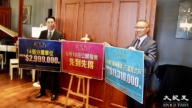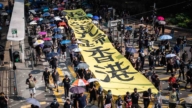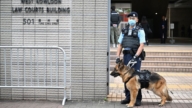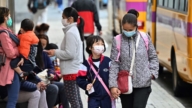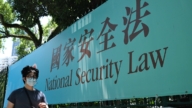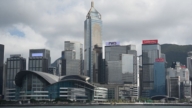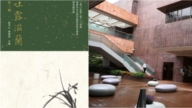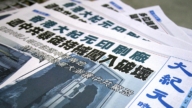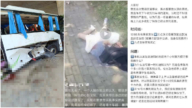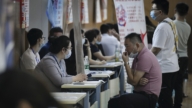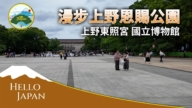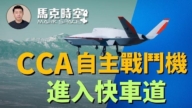【新唐人2012年6月22日讯】湖南维权人士李旺阳离奇死亡,不少香港报章大篇幅报导,但有百年以上历史的英文报纸《南华早报》则在第二天只以简讯处理,惹起业界和员工质疑,但当员工查问总编辑时,对方仅表示这是他的决定,并回复带有恐吓性的文字。事件惹来各界的关注,业内人士要求作出解释。
这个月6号,李旺阳被发现在医院窗户上离奇吊颈死亡,香港媒体在第二天普遍大幅报导,而《南华早报》只在A6内版刊登了一篇一百多字的简讯。
《南华早报》已有109年历史,是香港主要的英文收费报纸。
香港媒体披露,李旺阳离奇死亡当天,《南华早报》首版印刷的相关事件报导有六百多字,与零售版的一百多字简讯报导有相当大的差异。而删减后的简讯是由报社总编王向伟亲自拍板。
6月7号晚上,《南华早报》的一名外籍兼职编辑普莱斯(Alex Price)写电邮给王向伟,认为这样做是自我审查。但王向伟在电邮中回复说:“是我做出的决定……如果你不满意,你应该知道怎么做。”
普莱斯认为王向伟的回复具有恐吓性。
普莱斯表示,当其他媒体以大篇幅报导事件,向总编辑提出如此质疑实属合理,他认为,这样处理令新闻操守和《南华早报》的公信力岌岌可危,因此王总编辑欠员工和读者一个解释。
到目前为止,王向伟没有公开解释为什么要把李旺阳的报导缩减成简讯,不过他否认这样做是“自我审查”。
王向伟今年2月从报社副总编职位被晋升为总编。他16年前加入《南华早报》,曾任职《中国日报》,目前还担任中国吉林省政协委员。
香港媒体人程翔指出,随着有中共背景的媒体的渗透,原来在香港活跃、据有批判性的报业,不再触动一些敏感问题,媒体监督、批判的功能受到很大影响。
程翔:“ 《南华早报》这几年来有一个比较明显的变化,就是对中国、对中共的立场已经不再像以往这样采取一种批判性的态度,再加上政协总编辑上任以后,这个很明显。”
据说,《南华早报》现任副主编谭卫儿,也和中联办官员友好。
“香港记协”主席 麦燕庭“几年前已说,在不同机构里面有超过一半的传媒的老板或高层管理层,是有中方建制的背景,包括人大、政协,甚至是政协常委。这当然会影响到报纸的自我审查的情况严重了。”
麦燕庭认为,大家都非常关注王向伟的吉林省政协背景,是否影响他对中国新闻的态度,这也影响到《南华早报》的公信力,以致报社的百年基业,还会对香港和外国的读者产生影响。
麦燕庭表示,“香港记者协会”19号已经发电邮,要求《南华早报》对事情作出解释。
这起事件还引发香港政界的关注。包括立法会议员李卓人在内的许多人担心,如果王向伟不讲清来龙去脉,可能导致国际社会质疑香港传媒已经受到审查。
“独立中文笔会网路工作委员会”协调人野渡:“ 从香港回归以后这几年的情况来说,媒体的自我审查越来越厉害了,在《南华早报》看得见。但是除了自我审查之外,在《南华早报》这个事件里面,也不排除中资机构在里面对媒体人的收买、控制等等。”
野渡认为,随着香港对大陆的依赖越来越高,香港的政治自由、公共言论自由等空间也面临着被同化的趋势。
野渡警告,香港一旦失去它的普世价值观念,同时也将失去在国际上所享有的一切。
采访/秦雪 编辑/宋风 后制/君卓
Hong Kong Media Self-Censorship Exposed
The news about Hunan dissident Li Wangyang’s odd death
has made headlines in Hong Kong.
In contrast, South China Morning Post (SCMP), a 100-year
old English-language newspaper, only reported it in brief.
This sparked doubts of the SCMP’s employees
and the industry.
In response, the chief editor
threatened the staff’s questioning.
The event has attracted public attention, the SCMP was
asked by the industry to give a public explanation.
On June 6, Li Wangyang was found dead,
hung from the hospital’s window.
Hong Kong media made headlines the next day while
the SCMP only issued brief report of just over 100 words.
The SCMP, with 109 year history, is one of the most
expensive Hong Kong’s English newspapers.
Hong Kong media reveals that the SCMP’s headline news
were over 600 words, contrasting its 100-words brief report on Li Wangyang’s dubious death.
The cut-down was said to be approved
by the SCMP’s editor-in-chief Wang Xiangwei.
On the evening of June 7, Alex Price, foreign part-time editor
at SCMP, sent Wang Xiangwei an e-mail.
He commented on SCMP’s coverage of Li’s death,
mentioning that it was “like self-censorship.”
However, Wang replied, “I made that decision.
If you don’t like it, you know what to do.”
Price viewed Wang’s response as a threat.
Price said that when Li’s death made headlines,
his question to the chief editor was justified.
Such reporting approach could jeopardize the SCMP’s
credibility and media ethics, Price argues.
So Wang Xiangwei, as a chief editor, needs to explain
his decision to SCMP’s readers and staff, said Alex Price.
Wang has still not provided public explanation
why he reduced the coverage on Li Wangyang’s death.
However, Wang denied there was any talk
about “self-censorship."
Wang Xiangwei was newly promoted to chief editor,
this February from a deputy editor.
He joined SCMP 16 years ago after working for China Daily,
a mouthpiece of the Chinese Communist Party (CCP).
Wang is a member of Jilin Committee of the Chinese
People’s Political Consultative Conference (CPPCC.)
Hong Kong-based media professional, Ching Cheong says,
the CCP-backed media are entering Hong Kong.
Previously active and critical newspapers keep silence
on some sensitive issues.
This has exerted great negative impact on their roles
of being watchdog in journalism.
Ching Cheong: “In recent years,
SCMP changed significantly.
It no longer reports critically on China and the CCP,
as it did in the past.
And this attitude was seen more obviously after its
new chief editor took office, who is a CPPCC member.”
Reportedly, SCMP’s current deputy editor Tammy Tam
has connections with the CCP’ Liaison Office in Hong Kong.
Mak Yin-ting (Chairman, HK Journalists Association):
“Years ago, over half of Hong Kong’s media had CCP-backed owners or executives.
Like members of the National People’s Congress,
CPPCC members, and even Standing Committee members.
Of course, this had led to serious self-censorship
by the newspapers."
The public has cast attention on Wang Xiangwei’s CPPCC
membership as influencing his China news coverage.
This will affect SCMP’s century-old public trust
its readers in Hong Kong and overseas, thinks Mak.
Mak Yin-ting said, Hong Kong Journalists Association sent
an e-mail to SCMP on June 19, asking for an explanation.
This event also triggered political concerns in Hong Kong.
Politicians, including Legislative Councilor Lee Cheuk-yan,
worry that Wang’s actions may lead to international scrutiny.
A spotlight will be cast on Hong Kong’s media
as being under the CCP’s thumb.
Ye Du (Director, Independent Chinese PEN Center): “Since
Hong Kong went back to China media censorship worsened.
It’s beyond self-censorship, as mainland-funded businesses
buy and control Hong Kong media professionals.”
Ye Du remarks that Hong Kong is becoming
increasingly dependent on the mainland.
Thus Hong Kong’s political freedom and freedom of speech
is also faced with a trend of being assimilated.
However, if Hong Kong does not uphold universal values,
it will undoubtedly lose its international status, Ye Du warns.


